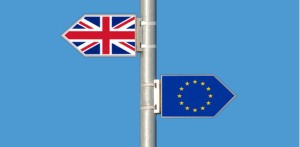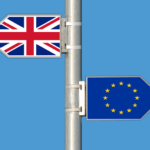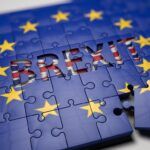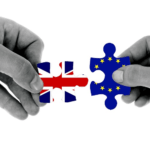The European Commission and the Government of Boris Johnson have reached an agreement to ensure that the rupture between the United Kingdom and the European Union takes place in an orderly manner, although the pact still needs the approval of European leaders and the approval of British and European Parliaments to be valid.
What the agreement consits of
In light of the United Kingdom’s decision to withdraw from the European Union, the European Commission has today reached an agreement at negotiator level with the UK on a revised Protocol on Ireland / Northern Ireland and a revised Political Declaration on the framework of the future EU-UK relationship.
The revised Protocol provides a legally operative solution that avoids a hard border on the island of Ireland, protects the all-island economy and the Good Friday (Belfast) Agreement in all its dimensions, and safeguards the integrity of the EU Single Market.
Northern Ireland will remain aligned to a limited set of Single Market rules to avoid a hard border on the island of Ireland. Today’s Protocol will also avoid any customs border on the island of Ireland, while ensuring that Northern Ireland remains part of the UK’s customs territory. The Northern Ireland Assembly will have a decisive voice on the long-term application of relevant EU law in Northern Ireland.
The main change in the Political Declaration relates to the future EU-UK economic relationship where the current UK government has opted for a model based on a Free Trade Agreement (FTA). The Political Declaration confirms the ambition to conclude an FTA with zero tariffs and quotas between the EU and the UK, and states that robust commitments on a level playing field should ensure open and fair competition.
Has the backstop been removed? Does it still exist?
The revised Protocol is no longer an insurance policy that applies unless and until the EU and the UK conclude a subsequent agreement that replaces it in part or in full. It is a fully legally operative solution that will continue to apply unless it fails to receive the democratic support of the Northern Ireland Assembly.
The Assembly will be asked to provide its continued support for the Protocol 4 years after the end of the transition period and every [4] years thereafter.
Obviously, the terms of the future trading relationship between the EU and the UK – in terms of our shared ambition to have zero customs duties and quotas between the EU and the UK – will have a bearing on the practical application of the newly agreed Protocol.
Northern Ireland will remain in the EU’s Single Market
Northern Ireland will remain aligned to a limited set of rules related to the EU’s Single Market in order to avoid a hard border: legislation on goods, sanitary rules for veterinary controls (“SPS rules”), rules on agricultural production/marketing, VAT and excise in respect of goods, and state aid rules.
How can Northern Ireland leave the EU’s Customs Union and still avoid a customs border on the island of Ireland?
Northern Ireland remains part of the customs territory of the United Kingdom. It will therefore be able to benefit from future Free Trade Agreements (FTAs) that the UK may conclude with third countries. Future UK FTAs may provide that goods produced in Northern Ireland can be exported to third countries on the exact same conditions as goods produced in other parts of the UK.
The Union’s Customs Code will apply to all goods entering Northern Ireland. This avoids any customs checks and controls on the island of Ireland.
As far as customs duties are concerned, EU customs duties will apply to goods entering Northern Ireland if those goods risk entering the EU’s Single Market. No customs duties will be payable, however, if goods entering Northern Ireland from the rest of the UK are not at risk of entering the EU’s Single Market.
This applies to all goods that are not subject to further processing and that meet the criteria that the Joint Committee will establish in order to determine the risk of the onward movement of that good, taking into account the specific circumstances in Northern Ireland. For goods from third countries not considered to be at this risk, the customs duties applicable in Northern Ireland will be the same as in the other parts of the UK.
The Joint Committee will establish, by the end of the transition period, the criteria for the above risk assessments and may amend the criteria during their application. Such criteria shall take into consideration issues such as the final destination of goods and value or risks of smuggling.
The UK may reimburse duties levied according to Union law in case the UK duty is lower, subject to appropriate safeguards on the correct application of EU state aid rules.
No duties will be payable for a number of specific cases, such as moving personal property, consignments of negligible value or sent by one individual to another.
EU’s Single Market
The revised Protocol on Ireland / Northern Ireland is a fully legally operative solution that avoids a hard border on the island of Ireland, protects the all-island economy and the Good Friday (Belfast) Agreement in all its dimensions, and safeguards the integrity of the Single Market. Northern Ireland will continue to apply the Union’s Customs Code and will remain aligned to those rules of the Single Market in order to avoid a hard border on the island of Ireland.
The necessary checks and controls will take place on goods entering Northern Ireland from the rest of the UK, including for example, Border Inspection Posts to ensure that the necessary sanitary and phyto-sanitary (“SPS”) controls are carried out.
UK authorities will implement and apply the provisions of Union law that the Protocol makes applicable in the UK in respect of Northern Ireland. Therefore, all checks will be carried out by UK authorities with appropriate supervisory and enforcement mechanisms for the EU.
Will Northern Ireland be able to benefit from future UK FTAs?
Northern Ireland will remain part of the customs territory of the United Kingdom. Nothing in the revised Protocol on Ireland / Northern Ireland prevents the UK from including Northern Ireland in the territorial scope of any of its possible future Free Trade Agreements, provided that those agreements do not prejudice the application of the Protocol.
This means that Northern Ireland would continue to be able to benefit from future UK FTAs in, for example, services and investment but also the export of its goods. Northern Ireland will be able to benefit from the import of goods that are not at risk of entering the EU’s Single Market either as goods by themselves or after having been subject to commercial processing.
What about VAT?
Northern Ireland will remain part of the UK’s VAT area, with HMRC remaining responsible for applying VAT legislation, including the collection of VAT, and the setting of VAT rates. UK will keep revenues accruing from this tax. In order to avoid a hard border on the island of Ireland, while protecting the integrity of the Single Market, the EU’s VAT rules for goods will continue to apply in Northern Ireland. In addition, VAT exemptions and reduced rates applied in Ireland may also be applied in Northern Ireland in order to avoid distorting the level playing field on the island. Northern Ireland continues to be able to operate the EU’s VIES system (VAT Information Exchange System) and to share data with Ireland and other Member States.
What about consent?
The EU and the UK have agreed to create a new mechanism on “consent”, which will give the Northern Ireland Assembly a decisive voice on the long-term application of relevant EU law in Northern Ireland, based on intense discussions between Ireland and the UK. The Commission has been in constant and close contact with the Irish government on this point.
This consent mechanism concerns the substantive issues of regulatory alignment on goods and customs, the Single Electricity Market, VAT and state aid.
In practice, this means that four years after the end of the transition period, the Assembly can by simple majority give consent to the continued application of relevant Union law, or vote to discontinue its application, in which case the UK would notify the EU. In such a case, the Protocol will cease to apply two years later.
Every four years thereafter, the Assembly can vote on the continued application of relevant Union law. In case a vote of the Assembly gathers cross-community support for the continued application of relevant Union law, the next vote can only take place 8 years thereafter.
Political Declaration
The main change in the Political Declaration relates to the future EU-UK economic relationship where the current UK government has opted for a model based on a Free Trade Agreement. The Political Declaration contains the shared ambition to have an FTA with zero tariffs and quotas between the EU and the UK. It states that safeguards on a level playing field should ensure a future relationship based on open and fair competition. The precise nature of commitments will be commensurate with the ambition of the future relationship and take into account the economic connectedness and geographic proximity of the UK.
Does this still mean that the UK will leave the EU on 31 October? What are the next steps?
It is for the European Council (Article 50) on Thursday 17 October to have a political discussion and decide on the way forward. The European Council (Article 50) needs to endorse the Withdrawal Agreement and approve the revised Political Declaration on the framework of the future relationship.
Before the Withdrawal Agreement can enter into force, it needs to be ratified by the EU and the UK. For the EU, the Council of the European Union must authorise the signature of the Withdrawal Agreement, before sending it to the European Parliament for its consent. It is up to the European Parliament to decide on the timetable for its work. The United Kingdom must ratify the agreement according to its own constitutional arrangements. In case there is no extension of the Article 50 period, Union law ceases to apply to the UK on 31 October.






Leave a Reply